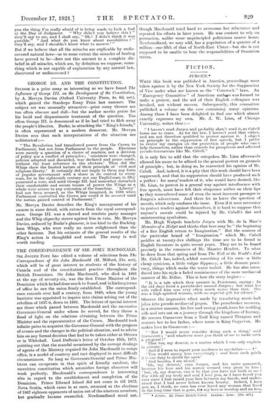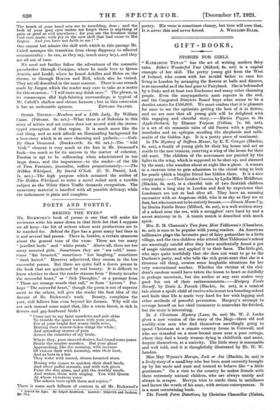FICTION.
JURGEN.•
•
WHEN this book was published in America, proceedings were taken against it by the New York Society for the Suppression of Vice under what are known as the " Comstock " laws. An " Emergency Committee " of American anthers was formed to make a protest, and the aid of their English colleagues was invoked, not without success. Subsequently, this committee published a volume on the case containing many opinions. Among those I have been delighted to find one which almost exactly expresses my own. Mr. J. W. Linn, of Chicago University, writes thus :- " I haven't read Jurgen and probably shan't read it, as Cabell bores me to tears. As for the law, I haven't read that either, and am not therefore qualified to protest against it. I object on principle to the suppression of free speech, but I prefer to center my energies on the protection of people who can't help themselves, rather than crusade for prosperous and affected pseudo-litterateurs like Mr. Cabell."
It is only fair to add that the outspoken Mr. Linn afterwards allowed his name to be affixed to the general protest on grounds of principle ; but, in doing so, he reasserted his opinion of Mr. Cabell. And, indeed, it is a pity that this work should have been suppressed, and that its suppression should have produced such a pother : for many'rettders of it., who would have desired, like Mr. Linn, to protest in a general way against interference with free speech, must have felt their eloquence wither on their lips
• s they remembered some of even the most innocent passages in Jurgen's adventures. And there let us leave the question of morals, which only confuses the issue. Even if it were necessary to protect readers against themselves, it is hard to suppose that anyone's morals could be injured by Mr. Cabcll's flat and uninteresting symbolism.
Mr. Hugh Walpole brackets Jurgen with Mr. de la Mare's Memoirs of a Midget and thinks that here may be " the beginning of a fine English return to Imagination." But the sources of the particular brand of " Imagination " which Mr. Cabell peddles at twenty-five shillings the time are to be found in English literature in quite recent years. They are to be found precisely in the romances of Mr. Maurice Hewlett. To what he drew from that spring and from The Well at the World's End Mr. Cabell has, indeed, added something of his own—a little cheap cynicism, a little vulgar flippancy, a little demure pruri- ency, things which make the water turbid. He has also intro- duced into his style a faded reminiscence of the more mediaeval manner of Mr. Belloo. This is how the story begins :- " It is a tale which they narrate in Poictesme, saying : In the old days lived a pawnbroker named Jurgen ; but what his wife called him was very often much worse than that. She was a high-spirited woman, with no especial gift for silence."
Observe the impressive effect made by translating music-hall jokes into pseudo-mediaeval jargon. The pawnbroker recovers, in a sinister manner, his free and roving youth, loses his scolding wife and sets out on a journey through the kingdoms of fantasy. He rescues Guenevere from a Troll King named Thragnar and restores her to her father, whose name is King Gogyrvan. Ho makes love to Gueneverc :-
"' But I would never consider doing such a thing,' said Guenevere ; ' and whatever must you think of me to make such a proposal ! '
' That too, my dearest, is a matter which I can only explain in private.'
' And if I were to report your insolence to my father— ? '
' You would annoy him exceedingly : and from such griefs it is our duty to shield the aged.'
And besides, I am afraid.'
' Oh, my dearest,' says Jurgen, and his voice quavered, because his love and his sorrow seemed very great to him : ' but, oh, my dearest, can it be that you have not faith in me ! For with all my body and soul I love you, as I have loved you ever since I first raised your face between my hands, and under- stood that I had never before known beauty. Indeed, I love_ you as, I think, no man has over loved any woman that lived in the long time that is gone, 1.02 my lovo is worship and no less.• • Juroen. By James Branch Cabell. London : Lane. (25s. net.1
The touch of your hand sets me to trembling, dear ; and the look of your grey eyes makes me forget there is anything of pain or grief or evil anywhere.: for you are the loveliest thing God ever made, with joy in the new skill that had come to His lingers. And you have not faith in me ! ' "
One cannot but admire the skill with which in this passage Mr. Cabell manages the transition from cheap flippancy to affected sentimentality : he can, as they say, touch many keys, and they are all out of tune.
We need not further follow the adventures of the romantic pawnbroker through Cooaigne, where he made love to Queen Anaitis, and Leuke, where he found Achilles and Helen on the throne, or through Heaven and Hell, which also he visited. They are all described in the same manner. There is one remark made by Jurgen which the reader may care to take as a motto for this occasion : " I will taste any drink once." The phrase, in its romanesque high-faluting surroundings, is typical of Mr. Cabell's shallow and obtuse humour ; but in this connexion







































 Previous page
Previous page